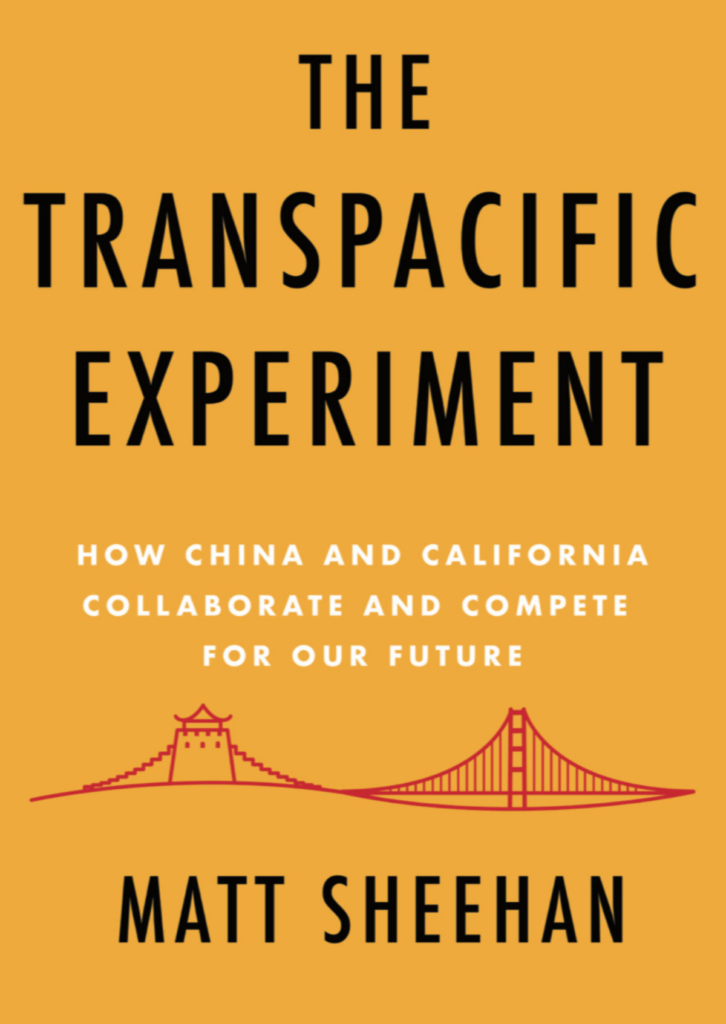Could the relationships between mayors, tech titans, real estate developers, families and students in California and China offer insights into the future of US-China relations?
The Big Idea
Today’s two biggest memes in global affairs are, arguably, Great Power competition and the potentially precarious future of US-China relations.
Yet, there is another story to be told about the unfolding future of US-China relations. This one is told not from Beijing and Washington. Instead, it comes from by mayors, students, technology start-up founders, real estate developers and moviemakers, and everyday residents and consumers.
As journalist Matt Sheehan explains in his 2019 book, they meet in California’s three defining industries—entertainment, technology and real estate. And far from the geopolitical slings and arrows, they are also shaping the future of US-China relations.
These relations make up what Sheehan calls The Transpacific Experiment: How China and California Collaborate & Compete for Our Future, and its effects are significant:
“As the top destination for Chinese investors, students, tourists, technologists, filmmakers, and home buyers, California is ground zero for this experiment in deep and multifaceted engagement between China and the United States.The results of this experiment—the personal ties, economic frictions, and technological innovations—are already reshaping China and the United States and filtering out into the international system that orbits around them.”
Learning about this counterintuitive approach to understanding a critical global issue of our time would be a good enough reason to read The Transpacific Experiment. But the book is also just a good read and full of engaging stories about the many individuals who have unwittingly become a part of this emerging cross-cultural experiment. Sheehan documents them through his own experience as a student and later a journalist in his native California and China.
What can The Transpacific Experiment tell us about the emerging future?
–The future of US-China relations may be created at the grassroots level, as much as by national policies and geopolitical gestures.
Sheehan upends longstanding assumptions that power and influence flow from states and their policies and actions toward each other. Instead, he puts a human face on how private institutions and individuals can shape business and political conditions.
In his telling, the everyday decisions of Chinese students on California campuses, American movie producers with big dreams of Chinese markets, and wealthy Chinese immigrants buying up American mansions are making matter as they work out how they will (or won’t) live and work together.
For those seeking to understand how consumer behavior, cultural representation, social attitudes, demographics in both countries might change concerning the other, Sheehan’s book makes a great starting point.
–The ascendancy of Chinese immigrants will stretch the American conception of what it means to be an American.
The quest to clarify what it means to be “an American” in the United States, a country forged by immigrants, is a well-trod American concern. Sheehan’s discussions of the arrival of wealthy Chinese investors eager to buy residential properties in liberal cities like Palo Alto and San Francisco reveal the ways that these new immigrants pull cherished ideas about immigration in new and challenging directions.
Sheehan reflects that “California today prides itself on embracing immigrants from all over the world, but that embrace has become more complicated when the new arrivals are wealthier than the longtime residents. It’s challenging many Californians to ask themselves, Do we welcome all immigrants, or just those of the “poor, tired, huddled masses” variety?”
This question is further complicated by the tendency of the wealthy home buyers to use their houses only part-time, if at all. This intensely irritates those who believe that immigrants to America should fully engage in becoming citizens and communities where they purchase homes.
-As Chinese influence grows globally and Chinese immigration continues, questions about how new Americans are expected to engage with their adopted society will continue to simmer.
The present antipathy at the national level to China is now affecting grassroots relationships. Sheehan’s book was published in 2019 during the Trump administration, which was fundamentally hostile to China. Yet relations in the first year of the Biden administration have continued to be confrontational, as both countries wrangle over issues such as cyberespionage, human rights and military activities.
In Sheehan’s observation, such deterioration is likely to filter down in meaningful ways to the grassroots relationships. “[T]he deepening negativity around the national relationship will likely discourage many potential students, home buyers, investors, and technologists from making the leap across the Pacific.”
Yet, it is not clear how any of this will unfold. As Sheehan concludes:
“In tracing these stories and writing this book, I constantly wrestled with how to assess the outcome of that experiment. Is Chinese investment creating American jobs or just making off with American intellectual property? Is Chinese real estate activity funding affordable housing or just driving up prices for everyone? Are Chinese students laying the foundation for a friendlier era of US–China relations, or will their arrival here end up driving these countries further apart? The transpacific stories in this book added new dimensions to my understanding of these questions, but rarely did they yield a clear answer. The problem is not just that we can’t pin down a precise cost-benefit calculation for these activities today. It’s that we’re only now witnessing the first-order effects of these phenomena. All of these interactions are like seeds being planted on both sides of the Pacific. We’ve watched as these seeds begin to sprout, but they won’t finish bearing fruit for years or even decades to come.”
For anyone interested in the future of the United States, international relations or leadership on critical matters from climate to trade in the near future, it may be worth watching not only Presidents Biden and Xi Jinping, but the investors and students and builders who are seeking to fulfill their own ambitions.


